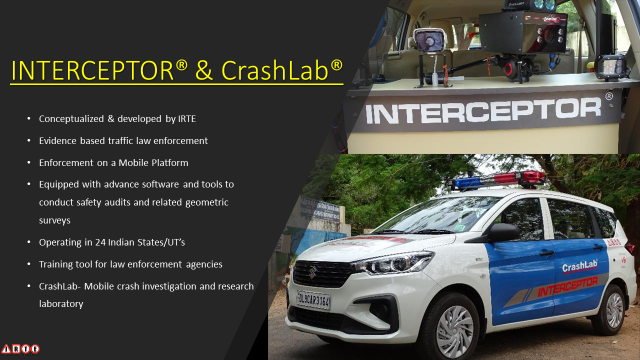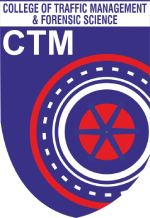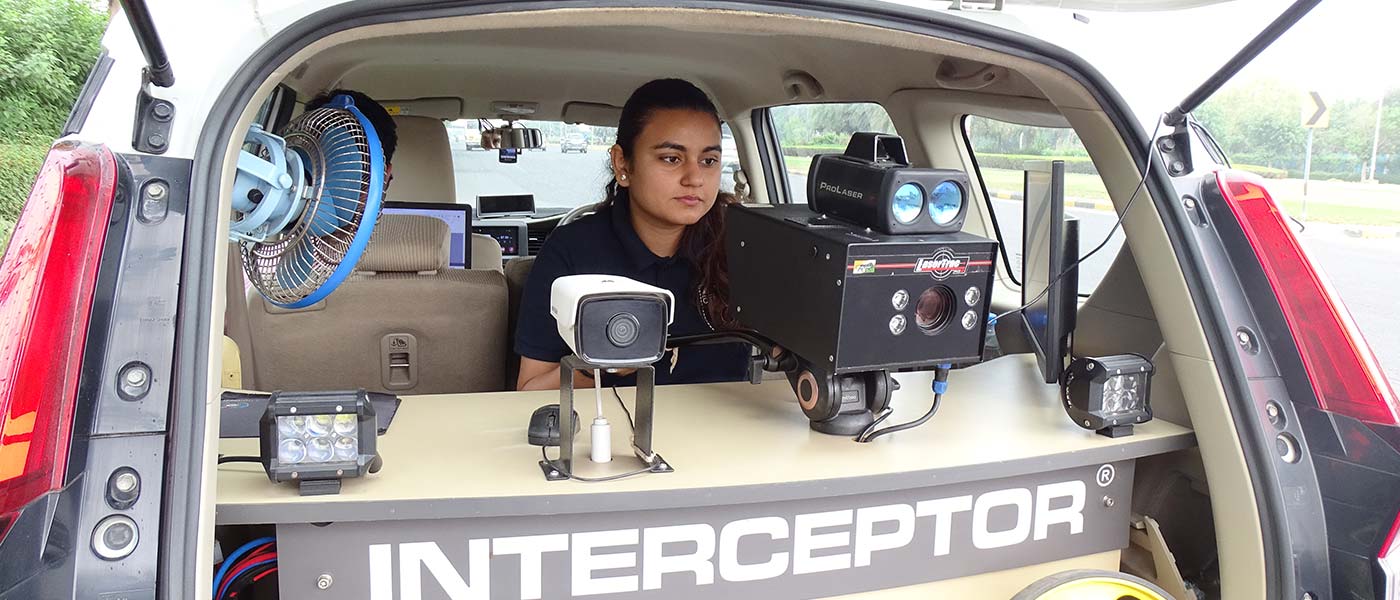Department of Traffic Enforcement
The Department
Over the last 32 years, the IRTE has played a role, that of the Government, without being asked to do so. From the development of enforcement technology, interpretation of the road traffic legislation, investigation and understanding of road crashes, development of tools and systems of police training and conducting the training itself.
The IRTE’s R&D oriented products include the Mobile Enforcement vehicle “INTERCEPTOR” and the Mobile Crash Investigation and Research Laboratory “CrashLab”.

Since 2002, the IRTE has been invited by the Sardar Vallabhai Patel National Police Academy, Hyderabad to conduct the training of IPS Probationers in the domain of traffic management and road crash investigation. For the years 2017, 2018 and 2019, the IPS probationer officers have attended this module at IRTE’s College of Traffic Management.
Since 2010, and on behalf of the Bureau of Police Research & Development, Ministry of Home Affairs, the IRTE has conducted 85 training programmes for police officers in the area of Road Accident Investigation.
Over the last 8 years the IRTE has conducted training for traffic police officers in 65 cities across India under the Road to Safety initiatives. Each programme was preceded by a research study conducted in all respective cities and adjoining highways, in order to understand the local conditions and problems. These include: causes and type of traffic violations, black spots, congestion, and issues related to traffic engineering and data management. Modules and delivery systems were tailor made to support the local police in their capacity building.
For the Ministry of Road Transport & Highways, Government of India, the IRTE has conducted more than 50 training programmes on traffic management and road accident investigation over the last 8 years, for officers of the transport department and the traffic police.
The IRTE has also conducted training for police officers from Myanmar, Sri Lanka, Bhutan, Nepal and Tanzania after conducting required research in the respective countries.



The Department of Traffic Enforcement
Traffic enforcement is normally referred to, as the supervision of road users’ compliance, with the traffic legislation, and punishment for non-compliance. The aim of enforcement is to prevent the occurrence of road traffic violations by means of control and punitive sanctions. In India, the legislation for road traffic rests the responsibility of compliance on the motorized vehicles only. In other words, there is no legislation that affixes the responsibility of desired road usage on non-motorized traffic like the pedestrians, cycle rickshaws, animal and man pulled vehicles, etc.
The fundamental issue of undefined authority and responsibility of the traffic police arises from the non-definition of traffic management. There are many areas of work that have been rested upon the traffic police by default which actually should not have been there in the first place. For example, the police are supposed to control traffic at uncontrolled junctions primarily because the road authorities have not traffic-engineered the intersection with need-based traffic control devices which demand the right of way. In India, therefore, the police are required to undertake the responsibility of traffic control and traffic engineering without any formal knowledge of the subject. Police today are required to ease congestion, fix speed limits, control traffic at controlled and uncontrolled junctions, and consequently, their main focus of enforcement is lost.
The domain of Traffic Enforcement in India as well in many countries of the Southeast Asian Region is a bit complicated and consequently, the training needs include many areas which include: legislative understanding, traffic engineering, VIP traffic management, dealing with the public especially the non-motorized traffic, usage of technology, accident investigation, data management, pre-hospital trauma care and dealing with the courts and much more.



A few words about our courses
Our courses are designed to improve safety and order on public roads by equipping the officers with the knowledge and tools needed to perform their duties effectively.
Each of our training begins with a pre-assessment of knowledge. This helps in further tailor-making our training modules. All sessions are need based, and refer to local traffic and roadway conditions where the officers have to perform their duties. Sessions are made in an interactive manner which include local film captures, and officers are encouraged to ask questions. The traffic officers may already be familiar with road traffic rules as they have been applying them for some time. However, they need this training in order to refresh and review their traffic management skills and how best to enhance relationships with the motoring public and other road users
Our training is so designed and delivered that boosts the morale and refreshes their skills and knowledge. This surely helps improve performance, and make the officers more effective, and such changes have been observed towards better performance. On the completion of each training programme, a post assessment of knowledge gained is always conducted. We prefer to conduct the courses at the Department of Traffic Enforcement at the College of Traffic Management, however when numbers of personnel are large, we offer to do so at the destination.
We do insist on conducting a detailed local study in order that we make ourselves fully aware of the issues and problems to be addressed in our training. The study is conducted by a team of Road Safety Engineers of the IRTE. Thereafter a specially customised course is developed. Materials which are distributed also include the local legislation which is coordinated in the course delivery.
Email - safety@irte.com
Call Us – +91 9310877770










